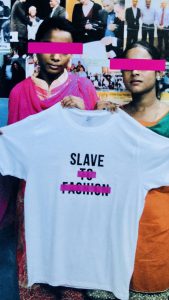
September 17, 2019, by htaylor
From fast-fashion to ultra-fast fashion: it is time to reveal the true costs
By Sacha McGowan-Crewe, Rights Lab Intern
The fashion industry is worth £32 billion to the UK economy, yet is the second highest at-risk sector for modern slavery. The International Labour Organisation defines modern slavery as a ‘situation of exploitation that a person cannot refuse or leave because of threats, violence, and abuse of power’. It is estimated that 40.3 million people are entrapped in modern slavery globally, with 71% of them being women. The global fashion industry remains one of the biggest drivers of modern slavery.
The pace of the fashion system is remarkable. The emergence of fast fashion pioneers such as Zara and H&M have enabled garments to move from design to sale in as little as five to twelve weeks, significantly outpacing the six to twelve-month cycle of traditional retailers. More recently, with the emergence of social media and digital communications a ‘new breed’ of fashion players have emerged: ‘ultra-fast’ online brands including Boohoo, Missguided and Pretty Little Thing, which can bring products from design to sale in as little as one week. Product regimes have responded to the expectations of consumers who want to follow fashion trends immediately, but at a fraction of the cost of traditional fashion prices. Ultra-fast fashion retailers are offering tops for £10, and bikinis for £1. Their fashion cycle operates on an occasion-driven basis, whereby consumers are buying new clothing for holidays, Bank Holidays, festivals, Christmas, Valentine’s Day and a range of other ‘occasions’ – to wear once and then to throw away. The instantaneous digital relay of fashion information without time-space barriers has fueled this ultra-fast fashion desire. In the UK consumers purchase 400% more clothing than we did just 20 years ago. If the recent past is any measure of the near future, this pattern of consumption will use ¼ of the world’s carbon budget by 2015 (Fashion Revolution 2018).

Safia Minney (2017) Slave to Fashion
There is emerging evidence that a geographical ‘re-shoring’ of production is underway as ultra-fast fashion brands locate close to market to avoid lengthy and expensive transportation costs. Having locations closer to home makes it relatively easy (and quick) to manage short supply chains and to deliver new items to websites (and into the hands of consumers) as quickly as possible. Fast fashion is never free and the demand for cheap labour has led to the rise of exploitative employment practices much ‘closer to home’ where there is an absence of employment contracts, breaches in health and safety practices, and poor enforcement of regulation and labour standards. Ultra-fast fashion retailers operate at such speed that their warehouses in the UK can be seen as ‘dark factories,’ where workers are paid on average £3 to £3.50 an hour – well below the National Living, which stands at £8.21 an hour for workers aged 25 and above. ‘Made in the UK’ should guarantee that workers are paid at least the minimum wage in a safe workspace. It is unacceptable that some workers in the UK are suffering serious breaches of health and safety laws in their places of work. The demand for cheap labour has created a race to the bottom and puts factory owners under pressure to offer garments at the lowest cost possible, meaning corners are cut, wages are kept at poverty levels and the temptation to engage in illegal employment practices is high
Whilst some enforcement action has been undertaken in the fashion and textile sector over recent years, it has clearly not had an effective impact on overall compliance. The 2015 Modern Slavery Act attempted to end slavery in global supply chains. It requires companies who turnover more than £36 million to report on their efforts against modern slavery annually. It has been argued that this is not robust enough to stop wage exploitation in UK clothing factories. A campaign group – Labour Behind the Label – launched a petition in 2019 calling for ultra-fast fashion brands to deliver a living wage to workers in supply chains. The fashion supply chain is spatially highly variegated and complex, with many aspects of the process contracted out to different suppliers. This lack of supply chain transparency makes exploitation, unregulated practice and illegal activity endemic. Therefore, it is essential to develop national and international legal frameworks, to eradicate modern slavery, and exploitative employment practices from the fashion industry.
Contemporary fashion has blurred the connection between consumer wants and needs. By treating clothes as disposable, we are fuelling a system that oppresses and exploits workers. The fashion industry churns out endless cheap clothes for ever-changing trends and does so at multiple costs. Consumption needs to be slowed down and use fewer resources. Fashion must be designed with longevity, resource efficiency, and good ethics in mind. It is vital to ensure that fashion retailers make drastic changes to improve their corporate social responsibilities. Together, consumers, NGOs, and governments have a responsibility to challenge corruption and strengthen human rights laws and codes of practice. Without this, people will remain dislocated and disconnected from power, resource, and opportunity. This dissociation inevitably leads to poverty and exploitation. The fashion industry has profited from the exploitation of workers and the environment. It is time to connect consumers, companies and the people who make our clothes.

[…] where labour costs are low. Clothes are then produced and shipped out at a high-speed rate (as fast as one to five weeks) to meet consumer demands. Keeping costs low and meeting high demand is the main contributor to the […]